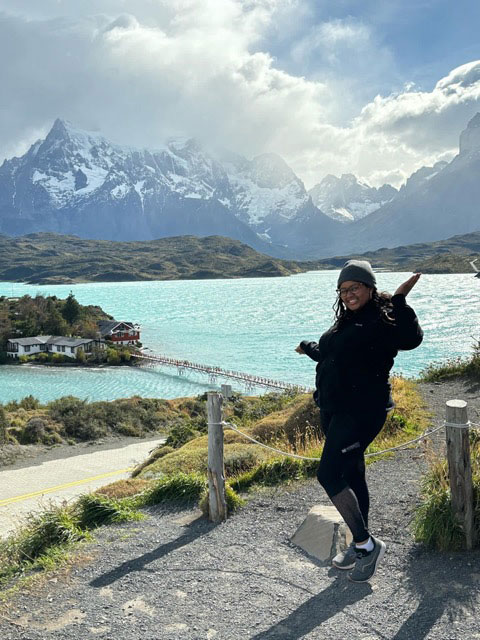Rising senior Trinity Pride had always dreamed of traveling to another country. Her hope was to one day visit Japan.
The dream moved closer to becoming a reality when she transferred to USC Upstate her sophomore year. At a study abroad workshop, she learned about the International Student Exchange Program, or ISEP, which allows students to spend a semester overseas for the same cost as a semester at Upstate.

After talking to Patrick McCleary, program manager for the Center for International Studies, Pride was convinced. “I was like: ‘I have to do this.’”
Through ISEP, students select five preferred countries, and are placed based on availability, according to Pride, a political science major. Japan made her list, as did Chile, which was No 3.
She was assigned to Chile, where she’s spent the past semester studying at Pontifical Catholic University of Valparaíso.
Pride left the U.S. in late February and will return in July. She’s been taking classes, visiting sites, and learning a new culture over the last few months.
“I’m pretty interested in working at an embassy, like working in the foreign services,” says Pride.
She chose to study political science at the recommendation of her mother’s friend, and later had a pre-law fellowship at Duke University. Since then, she focused on foreign affairs and is a global studies minor.
She spent her first few weeks in Chile getting adjusted – settling in with her host family, learning how to get around, figuring out a new currency (pesos), and walking around or taking trips to the mall or the beach.
Pride describes her class schedule as different from Upstate. Chilean culture was part of her classes, which she says has enriched her minor. She studied an indigenous group, the Mapuche, traditional Chilean dance, Latin American film, and Spanish.
In her Mapuche class, Pride said students divided into groups to prepare presentations for the class. Each week a different group would lead instruction for the class. “You learn a lot from that,” she says.
She also loved her Chilean dance class. She learned the merengue and bachata as well as traditional dances such as the cueca and the Rapa Nui. The latter dance can be traced to Easter Island, a Chilean territory.
Outside of classes, Pride spent time with new friends and her host family. Though she had taken years of Spanish, Pride still had to work on the language barrier. Being immersed in the culture and living with a host family helped build her confidence.
“As I’ve grown to know more Spanish and get more comfortable with the family, it’s like my second family, honestly,” she says. “It was an adjustment, but I think that I’ve adapted, especially with the friends I’ve made here.”
This was Pride’s first time overseas, and the farthest away she’d been from family since her participation in a border immersion program in Texas. She’s noticed how much she’s grown personally as a result.
“I’m more excited about learning now than I feel like I’ve ever been because I’m in another country doing it. And it’s something I’ve always wanted to do,” she says.

She also appreciates all the help she received from McCleary as she prepared her application and coordinated course credits with her advisers. She even got a list of food recommendations from Isabel Treanor, international student services coordinator.
Given her experiences, Pride says she would encourage everyone to step outside the bubble of the U.S. and try something new.
“Whether you’ve been in the same state your whole life, or just been in the same area. … It’s really eye-opening to see the different cultures and immerse yourself and just learn.”
